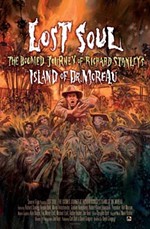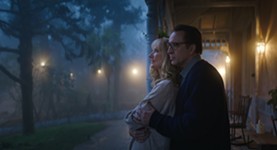Richard Stanley, Cinema's Lost Soul
Director on new documentary about the Dr. Moreau disaster
By Richard Whittaker, 12:05PM, Wed. Feb. 25, 2015
It's not often that you get to ask a filmmaker whether they regret hiring a warlock. But then, Richard Stanley isn't most filmmakers.

In the mid-Nineties, he was poised to become a top-flight Hollywood director. His debut feature, Hardware, is a post-apocalyptic cyberpunk skullshock: and while sophomore endeavor Dust Devil suffered a miserable re-editing at the hands of a studio that did not understand it, turning Stanley's mystical horror into a road-trip slasher movie, his adaptation of H.G. Wells' The Island of Dr. Moreau was destined to be an arthouse/blockbuster fusion.
Instead, it became an infamous bomb. Stanley was removed from his own project and replaced by John Frankenheimer, who quickly drove the careening catastrophe over the cliff. Now the tale of madness, egos, and on-set clashes between Stanley, the studio, and stars Marlon Brando and Val Kilmer is retold in new documentary Lost Soul: The Doomed Journey of Richard Stanley's Island of Dr. Moreau (read our review here). The film screens tonight at the Alamo Ritz, but Stanley talked to the Chronicle after its Fantastic Fest debut about the film's tortured origins, his clashes with the producers, and hiring a warlock called Skip to help get the film made.
Austin Chronicle: I've asked a lot of documentarians how they picked the topic for their film, but what was it like for you as a filmmaker to become the subject, with your name even in the title?
Richard Stanley: With Moreau it's been particularly confusing, because I started out being the writer of the screenplay, and then trying to be the director, then being moved from being the director, and having to become the dog extra, it makes some kind of sense to suddenly become a character in the story. The role keeps shifting. Obviously it's something I didn't intend, in that (documentarian David Gregory) was filming extras for the Hardware DVD that he was releasing, and asked a few questions about the Moreau thing. Over the last 20 years, everyone who interviews me feels compelled to ask at least one question about The Island of Dr. Moreau. That seems to sneak into any interview, no matter what the subject was, and I think David just ran with the answers I gave him.
AC: How is that for you personally, knowing that it's going to come up?
RS: It's always been the brontosaurus in the room, really. It's so pronounced that me and my girlfriend both have a drinking game based on every time the 'What was Marlon Brando like?' question comes up. We're always hoping that this time, this time maybe, as the subject is something else entirely, the war in Afghanistan or whatever the interview is about, that somehow it wouldn't sneak in. But always, at the end of the interview, people just can't resist asking what happened. So, of course, there's the sense that doing it this way there's finally a requiem. The story will be told in some kind of detail that, after the initial rush of getting the thing released, with many, many more Moreau stories coming up, maybe it will go silent for a while.

AC: The book of Moreau is very much about the British colonial and imperial experience. Being South African, was that part of the appeal of the story?
RS: It certainly was part of the appeal of the original book, and I think also one of the problems with [distributor] New Line and the American market. In that, America doesn't have the same historical perspective as the Brits and the South Africans. Wells is really aware that the whole colonial idea of trying to bring civilization to the wild is a doomed endeavor that will end up in some nightmarish debacle. I don't think the United States has been through the same experience yet, and so can believe that it's still possible to go and solve situations like that, take over other countries and have a regime change, and do it successfully. Whereas we know that if you go in and get rid of Dr. Moreau and replace him with Montgomery or the hyena-swine, it's not going to get any better.
AC: You'd already been through the studio meat grinder with Dust Devil. Was there a point where you went, "I just don't want to deal with a studio ever again"?
RS: I was so in debt by the end of Dust Devil, having picked up the tab personally for the post-production of the movie, and having no way to recoup because I didn't own the rights to the movie. There was no way I could see any money back on it, so any money spent was just a dead loss. We had to, nonetheless, get the thing completed, or at least get it to an answer print and then get the answer print digitally transferred, so at least people could see it. But by the time I got there, I was very substantially in the red. I'd lost my flat, lost most of my possessions, and my partner had split up with me. The process had been incredibly destructive, basically being a huge black hole into which I threw all my money at that time, trying to get it finished. So I had no choice but to do a deal as fast as possible with anything that was lying around, and Moreau happened to fit the bill.
AC: Was there no point when you thought, I'll go and sell cars instead?
RS: It probably would have been wiser. Obviously if you're Coppola going into Apocalypse Now off the back of the two Godfathers, you're in a much better position than coming off the back of something like Dust Devil, which had scarcely been released, and was pretty much lying around in film cans in different places.
AC: The documentary makes clear that the studio got more and more involved as Moreau got bigger, and vice versa.
RS: This was a big problem, and it really happened from the moment Brando came on board. The minute Brando was involved, everyone else in the world wanted to be involved in the project somehow. Which wasn't so bad when it came to initially securing the leading men, Bruce Willis and then James Woods, but it was weird on a day-to-day basis, how many people were suddenly knocking on my door, or paying friendly visits to my office.
AC: Even prior to this, even from the mid-Fifties, Brando had a reputation of being difficult to work with, but people still flocked to him. It's like hiring Klaus Kinski: you'll get something great out the other side, but the process means you'll want to throttle him at some point. What was the process, for you, of making that calculation?
RS: I still personally wish that Kinski was still around. I'm one of those maniacs that would have loved to have put him in a cameo somewhere. With Brando, apart from being an admirer of the man, it was simply a way of getting the thing made. I'm not convinced he ever really read the script, but it was clear that, if you put a million dollars in escrow, then he'd potentially agree to do your movie – which is what I believe [the producers] did – parked the money in escrow, showed him the money, and Brando basically agreed to favor us. By doing that, it magically turned the key on the production and got the thing moving. No one was prepared to come in on the back of Brando's name, but that was enough to draw other cast to the material. People who would normally have never read the screenplay. There was no way I could have gotten a read out of Bruce Willis without having Marlon Brando. So it was one route to getting the film made – another devil's deal, as such.
AC Did you ever regret using Skip the warlock's services?
RS: That was a very, very bad idea. Probably one of the fundamental mistakes of my life, unless it was a complete coincidence. Skip had done some fixes for some of my friends. I had a friend who used to import a cigarette brand called Death Cigarettes into the UK, and Death Cigarettes had gotten into legal trouble with other cigarette companies that had tried to force him out of business. He'd called Skip in, and he'd done the same thing: cut his arm, convened his coven, and within 24 hours outside investors that my friend BJ had never heard of before came in and invested in his company for over a million pounds. Skip had a track record for doing things that actually worked, and I was desperate. Obviously, after everything turned out as strikingly badly as it did, I had cause to regret it.
Lost Soul: The Doomed Journey of Richard Stanley's Island of Dr. Moreau screens at the Alamo Ritz tonight, Feb. 24, accompanied by a screening of Hardware (tickets at http://www.drafthouse.com). It returns to the Marchesa Theater, courtesy of the Austin Film Society, on March 29, and is available on VOD now.
A note to readers: Bold and uncensored, The Austin Chronicle has been Austin’s independent news source for over 40 years, expressing the community’s political and environmental concerns and supporting its active cultural scene. Now more than ever, we need your support to continue supplying Austin with independent, free press. If real news is important to you, please consider making a donation of $5, $10 or whatever you can afford, to help keep our journalism on stands.
Marc Savlov, Sept. 22, 2014
Richard Whittaker, Sept. 19, 2019
Richard Whittaker, Aug. 20, 2019
April 20, 2024
April 19, 2024
Lost Soul: The Doomed Journey of Richard Stanley’s Island of Dr. Moreau, Richard Stanley, Dust Devil, Hardware, Alamo Drafthouse, Fantastic Fest, Austin Film Society, Severin Films












